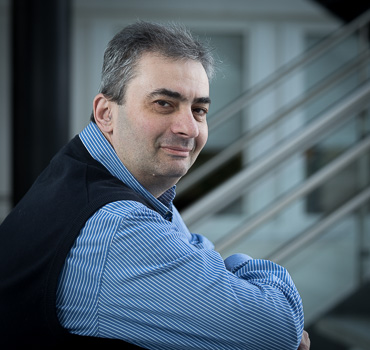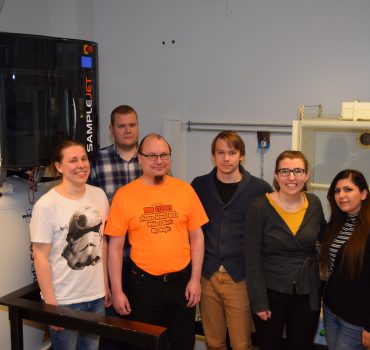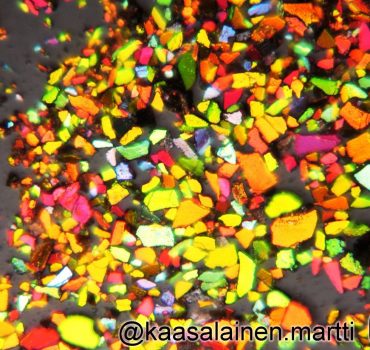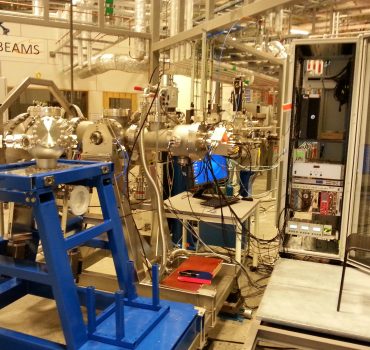Research Groups and R&D Platforms: Preclinical development

Research Group:
Complex Reaction Kinetics and Thermodynamics
Dmitry Murzin
dmurzin[at]abo.fi
Industrial Chemistry and Reaction Engineering,
Åbo Akademi University
Basic research, Cancer, Lead optimization, Medicinal chemistry, Nanoparticles, Natural products, Neurological disorders, Organic compounds, Physico-chemical properties, Porosity, Preclinical development, Surface area, Synthetic chemistry, Zeta potential

R&D Platform:
The Instrument Centre
The Instrument Centre serves as a shared facility for University of Turku and Åbo Akademi University. With five modern NMR (Nuclear Magnetic Resonance) instruments and a sophisticated mass spectrometer, the Centre is one of the best equipped educational NMR/MS facilities in Finland. Our main focus is in NMR spectroscopy and for the applications we have 400, 3 x 500 and 600 MHz Bruker Avance III spectrometers. The instrumentation was completely updated during 2016. Two of the instruments are equipped with Prodigy cryoprobe systems to enhance the sensitivity of the measurements significantly. In addition, our 400 MHz instrument is equipped with two solid state probes which enable the experiments with solid (CP-MAS) and semisolid (HR-MAS) materials. Three instruments are situated in building Arcanum (UTU) and two in Axelia (ÅAU).
Our own research covers all aspects of NMR applications. However, the main focus is on NMR metabolomics research of biological samples. The Instrument Centre offers also services for non-academic users. For more information, please visit at our webpage: instrumentcentre.utu.fi.
Basic research, Hit to lead, Lead optimization, Metabolomics, NMR, Preclinical development

Research Group:
Preclinical Imaging
Tove Grönroos
tovgro[at]utu.fi
Turku PET Centre,
University of Turku
Biomarker, Biomedicine, Breast cancer, Cancer, Clinical Medicine, Disease models, Drug target, Imaging, In Vivo Diagnostics, Inflammation, Metabolic diseases, Molecular Biology, PET, Physiology, Preclinical development, Prostate cancer, Squamous cell carcinoma

Research Group:
Mechanisms of steroid hormone action
Matti Poutanen
matti.poutanen[at]utu.fi
Institute of Biomedicine,
University of Turku
Basic research, Biochemistry, Bioinformatics, Biomarker, Biomedicine, Breast cancer, Cancer, Data mining, Disease models, Drug delivery, Endocrinology, Genomics, Imaging, In Vitro Diagnostics, Machine learning, Metabolic diseases, Molecular Biology, Molecular Cell Biology, Next-generation sequencing, Obesity, Ovarian cancer, Pathology, Pharmacology, Physiology, Preclinical development, Prostate cancer, Proteomics, Receptor, Reproductive Medicine, Signaling, Systems Biology, Target discovery

R&D Platform:
Industrial Physics Laboratory
The Industrial Physics Laboratory has over 30 years’ experience in pharmaceutical research in collaboration of national and international pharma companies. The laboratory is equipped with extensive thermoanalytical instrumentation (TG, DTA, SMA, DSC, isothermal microcalorimetry) and X-ray diffraction equipments. Other techniques include also a modern gas sorption apparatus (TriStar), FTIR, fluorescence spectrophotometry, dynamic light scattering and zeta potential measurement instrument as well as access to surface analytical instruments such as TOF-SIMS, HR-SEM, and XPS.
The common research services laboratory have provided include stability and compatibility studies of pharmaceutical formulation, determination of surface amorphicity and crystal polymorphism studies. The main academic research topic of the laboratory is mesoporous drug delivering materials, which has been studied since 2004. In addition, the electrostatics of powders has studied in the laboratory for almost 20 years already including a number of consultant services to industry.
The Industrial Physics Laboratory
Hit to lead, Lead optimization, Preclinical development

R&D Platform:
Materials Research Laboratory
Materials Research Laboratory consists of two research groups, Materials Science (Prof. Edwin Kukk) and Materials Physics (Prof. Kalevi Kokko), focusing on both fundamental and applied physics. The interdisciplinary research combines experimental, computational, and theoretical investigations on, for example, organic molecules, semiconductors and other electronic materials, interfaces and surfaces of various systems, metal clusters and metal alloys with aim to better understand the physical and chemical phenomena and to develop materials for new technologies. National and international collaboration with other departments, universities and companies is an important part of our research.
The experiments are performed both at home laboratory and synchrotron facilities around the world. Electronic, chemical and structural properties of different type of materials are studied combining several spectroscopic and microscopic methods like Time-of-flight/mass spectroscopy (TOF/MS), Photoelectron or Auger electron spectroscopy (XPS/AES) , Scanning tunneling microscopy (STM) and Electron diffraction (LEED) together with computational material physics. The know-how on development of new materials (e.g., surface passivation coatings) for electronic industry applications is strongly related to the thin film growth by using home-build atomic layer deposition equipment. We also design and build research instruments like electron-ion coincidence spectrometers or cluster sources to be used in gas-phase studies of molecules and clusters.
Lead optimization, Preclinical development


